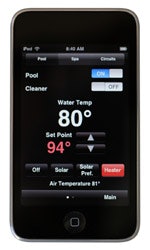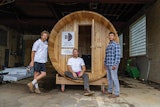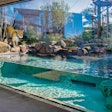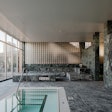
It's free; all part of the package. (After 90 days, a check will be required.) The company, Colorado Poolscapes, doesn't actually leave an employee on-site to make sure the operation is running smoothly, it keeps an eye on everything from the home office in Glenwood Springs.
It does this using an inexpensive software package that bolts onto the pool owner's home-based control system. It demands little in terms of effort or manpower; multiple pools are displayed at once on a computer screen at the home office, and when readings on one parameter or another drift out of range - say, the salt level drops too low - the system alerts the operator.
In a part of the country known for its pioneers, Colorado Poolscapes is keeping up the tradition. The company is pioneering the future of pool care.
"In the pools where we have installed it," says co-owner David Anderson, "it's invaluable. In fact we have one that's several hundred miles away. We can just go online and look at what's going on and take care of problems on the spot or call the homeowner and tell them and they can take care of it, depending on what it is."
Pools that are distant or difficult to access are an obvious application for this kind of remote monitoring system, but the big payoff is the ability to command multiple pools at one time, Anderson says.
"You just pop that screen up, and if something isn't right, you see a little alarm. Anything that the control system is directly controlling, you can pretty much make your adjustment remotely. If you have an actual physical problem, say, with the heater, you're more on the diagnostic side of the thing, so you send a guy out to look at it."
Context, Please
At the moment, this kind of service model exists at singular, forward-looking companies like Colorado Poolscapes, but what's important is that through advanced controls, a company can now provide pool owners an unparalleled level of operational assurance, and even fix some problems with a mouse click from an office far away.
As Anderson points out, the level of actual service and maintenance is currently limited. That will change.
More on that later. For the moment, a little context.
For years, controls were considered of marginal importance to the overall system, an add-on offering limited range of function at a relatively hefty price.
Years of product development and investment, however, have produced much-more-potent control products at ever-lower prices. This is taking place before a backdrop of heightened energy consciousness, where the ability of controls to wring cost savings from pool operation is driving sales.
In the words of David MacCallum, senior product manager, lights and automation, Pentair Water Pool and Spa, Sanford, N.C., "The control segment has been growing since early in this decade. It's exploded much like salt chlorine generators did."
Kevin Potucek, vice president of marketing, Hayward Industries, Elizabeth, N.J., puts it in slightly different, but meaningful terms. "The value proposition for controls has improved and continued to grow even as the number of new pools has receded," he says.
This improvement in "value proposition" has been spurred by one advance after another. For instance, the simple wireless remote - a pedestrian tool of modern life that saves people the trouble of getting up from the couch - has been much more beneficial to the pool control segment, allowing easier and cheaper retrofits.
"Before the advent of reliable remote control," Potucek says, "wires would have to be run between the pool equipment and the house or control panel, whereas now, it's simply a matter of putting the control actuator on existing equipment and allowing it to receive a signal from the remote."
All of this, the energy savings, the wire-free installation, the increase in software capability, and the natural fall in manufacturing cost as products mature, has moved basic controls into the mainstream.
"We sell the Aqua Logic hand-held remote control to almost every customer now," says Clarence Kaye, owner of Pioneer Valley Fiberglass Pools & Spas in Holyoke, Mass. "We're able to justify the upsell because even if they spend a little more on the remote control, they may be looking at $800 in electrical labor to internally wire switches to locations in their house, and the switch might not even be where they want it anyway. With the remote, they can run the pool from anywhere in the house. When you show people value, the money doesn't hurt so bad."
Telemetrics
As with other software-based phenomena such as Facebook and the iPhone, new ways of using pool control are being discovered, changing the way pools are operated now and most certainly in the future.
In short, greater Internet access and cell phone use along with sophisticated pool control is starting to have a real effect on the way customers can use their pools.
"We took Screen Logic (Pentair's computer-control interface), with it's colorful screens and advanced graphics, and married it with the Internet, so it's able to browse the Web and grab things like a five-day forecast and send and receive e-mail," says MacCallum. "A few months ago, we started offering an iPhone interface, which we give away for free.
"It allows people to do what they want to do, even away from home. What do they want to do? They want to check on their pool to see what's been going on. Have the kids been having a pool party? The lights and pump were on from 2 to 4 a.m. last night. Hmmm . . . what's going on there?"
"You can even tell," says Anderson, "if the subscriber has an outdoor equipment room, exactly when somebody has opened the door, because you see a dip in the temperature of the equipment as it's graphed over time. You can pull up the history of it and tell that. That can actually be quite useful, too."
"With the video adapter," says MacCallum, "they can tie-in up to four video cameras. So they can log in from anywhere on their iPhones and view live, streaming video of their pool and backyard, and even pan the cameras around and see what's going on.
"The camera detects any motion (and you can set the level of motion required to activate it), so if a person is walking in your backyard or someone jumps in your pool, it will actually take a picture and e-mail it to your laptop, PC or cell phone. The homeowner knows the instant anything happens in the backyard.
"Or if you're on vacation, and there's a storm back home and you're wondering, 'Did that storm last night trash my pool? Or did the neighborhood kids jump the fence and have a party in my pool?' It gives a sense of security to that homeowner to know what's going on."
The goal of this development, MacCallum says, is to give customers maximum control over their pool at all times. "Some customers don't want it, they just want all basic equipment, but on the other side, you've got people who have grown up in the Internet age, that expect this level of control. They're asking, 'Why haven't you done this before? Why couldn't I control my pool with my iPhone before?'"
Remote Road
Back in Glenwood Springs, David Anderson is thinking about where all this might lead.
"Right now, the capability is such that, if you can get over a threshold in terms of number of subscribers, then you could offer daily monitoring of pools for a certain fee," he says. "Since we have a large service route to run, it's something for us to start pushing toward, where the more people you can get onto the service the better it works for you."
But it's the future possibilities of remote control and monitoring that excite Anderson. He points out that automatic chemical feeders are commonplace in the industry, and the advent of a system where multiple factors of pool chemistry can be adjusted from a remote location seems inevitable. "Something where you'll be able to look at that screen and say, 'The pH is a little high, let's give it a little acid, or maybe we need a little chlorine shock here,' and you'd be able to do that from a remote location.
"I know they're looking into that, a system that covers the whole package. And that really is a whole new level of service.
"I think it's got to be one of the most exciting things that's happening to our industry. It works quite well with the clients we have on it, the uphill battle is just showing people how much it can do."
Comments or thoughts on this article? Please e-mail [email protected].












































